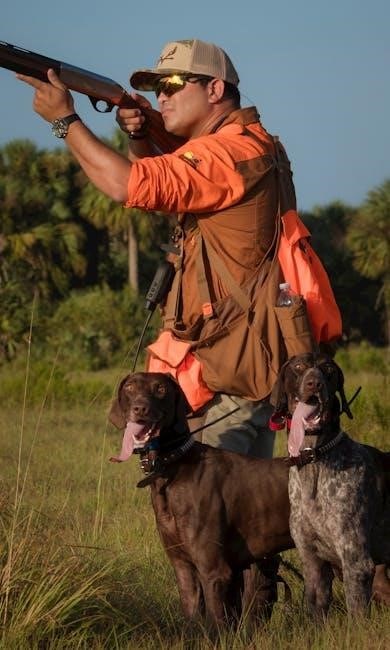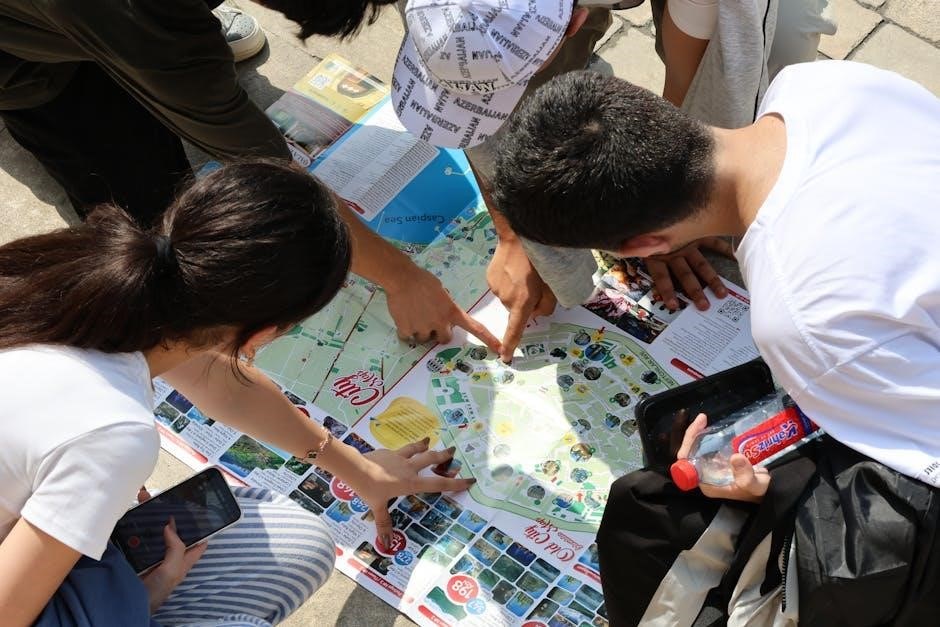Becoming a hunting guide requires passion for the outdoors‚ physical stamina‚ and deep knowledge of wildlife. Guides ensure safe‚ successful hunts‚ offering expertise and mentorship to clients.
1.1 Understanding the Role of a Hunting Guide
A hunting guide ensures successful and safe hunting experiences by providing expertise‚ mentorship‚ and knowledge of wildlife patterns and habitats. Guides must possess strong communication skills to interact with clients effectively‚ teaching them essential skills like scouting and firearm safety. They also need to understand legal and ethical hunting practices‚ ensuring compliance with regulations while promoting conservation. Physical stamina is crucial‚ as guides often work in remote areas for extended periods. Additionally‚ guides must be adept at leadership‚ decision-making‚ and problem-solving to manage various hunting scenarios and client needs effectively.
1.2 Importance of Hunting Guides in the Industry
Hunting guides play a vital role in ensuring safe‚ ethical‚ and successful hunting experiences. They possess deep knowledge of wildlife habitats and behavior‚ enabling clients to locate and harvest game effectively. Guides also promote conservation by teaching sustainable practices and respecting animal patterns. Their expertise enhances the overall quality of the hunting industry‚ fostering trust and satisfaction among clients. Additionally‚ guides contribute to the industry’s growth by mentoring newcomers and maintaining high standards of professionalism and ethical conduct‚ ensuring the sport’s longevity and positive reputation.

Education and Certifications
Education and certifications are essential for aspiring hunting guides‚ ensuring they possess the necessary knowledge and skills to lead safe and effective hunting trips.
2.1 Hunter Safety Courses
Hunter safety courses are fundamental for aspiring guides‚ teaching essential skills like firearm handling‚ wildlife conservation‚ and ethical hunting practices. These courses‚ often mandated by state laws‚ cover safety protocols‚ hunting regulations‚ and survival techniques. Completing a certified hunter safety program demonstrates a commitment to responsible guiding and ensures clients’ safety. Many states require guides to hold both hunter safety and first aid certifications. These programs also emphasize environmental stewardship and game management‚ fostering a deeper understanding of ecosystems. By mastering these basics‚ guides build a strong foundation for their career‚ enhancing credibility and professionalism in the field.
2.2 Guide-Specific Certifications and Training
Beyond basic hunter safety‚ guide-specific certifications are crucial for professional credibility. Many states and organizations offer specialized training programs tailored for hunting guides‚ focusing on advanced wilderness skills‚ navigation‚ and client management. Certifications like those from the Outdoor Industry Association or local guiding associations often include modules on risk management‚ first aid‚ and environmental stewardship. These programs ensure guides possess the expertise to lead safe and successful hunting expeditions while adhering to industry standards. Obtaining these certifications not only enhances your reputation but also demonstrates a commitment to client safety and ethical guiding practices.
Gaining Experience
Gaining experience is crucial for becoming a skilled hunting guide. Start by assisting experienced guides‚ learning hands-on skills‚ and gradually taking on more responsibility. Over time‚ transitioning from supporting roles to leading hunts builds confidence and expertise‚ ensuring you’re prepared for the challenges of guiding.
3.1 Apprenticeships with Experienced Guides
Apprenticeships with experienced guides provide invaluable hands-on learning. Working under a seasoned guide allows you to observe and participate in real-world scenarios‚ gaining insights into tracking‚ habitat understanding‚ and client management. These mentorship opportunities help refine your instincts and build confidence. By assisting on hunts‚ you learn how to handle unexpected challenges and develop the skills needed to ensure safe and successful outings. This practical training lays the foundation for becoming a competent and reliable hunting guide‚ preparing you to lead your own expeditions in the future.
3.2 Building a Network in the Hunting Community
Building a strong network within the hunting community is essential for success as a guide. Attend hunting expos‚ join local clubs‚ and engage in online forums to connect with experienced guides‚ outfitters‚ and hunters. These relationships provide opportunities for mentorship‚ referrals‚ and shared knowledge. Collaborating with other professionals fosters trust and credibility‚ which are vital for attracting clients. A robust network also offers support during challenges and helps stay informed about industry trends‚ ensuring you remain competitive and well-respected in the field.

Physical and Mental Preparation
Physical stamina and mental resilience are crucial for hunting guides‚ as they endure harsh environments and make quick‚ strategic decisions to ensure successful and safe outings.
4.1 Physical Fitness Requirements
Becoming a hunting guide demands exceptional physical fitness to navigate challenging terrains‚ carry heavy gear‚ and endure long hours in demanding conditions. Guides must possess strong cardiovascular endurance‚ muscular strength‚ and stamina to hike miles with packs‚ often in rugged landscapes. Core strength and flexibility are essential for stability and balance. Regular exercise‚ such as running‚ swimming‚ and strength training‚ is crucial to build and maintain the necessary physical capabilities. Guides must also be able to lift and maneuver equipment‚ making consistent physical conditioning a priority for safety and effectiveness in the field.
4.2 Mental Toughness and Decision-Making Skills
Mental toughness is crucial for hunting guides‚ as they face unpredictable and high-pressure situations in the field. Guides must remain calm and composed under stress‚ such as navigating dangerous terrain or managing unpredictable wildlife. Strong decision-making skills are essential to ensure client safety and success. This includes assessing risks‚ adapting to changing conditions‚ and making quick‚ informed choices. Mental resilience helps guides stay focused during long‚ challenging hunts‚ while also maintaining a positive attitude to keep clients motivated and engaged. These traits are vital for building trust and delivering a safe‚ memorable experience.

Understanding the Outdoors
Understanding the outdoors involves knowledge of ecosystems‚ weather patterns‚ and navigation. It enables guides to track game effectively and ensure client safety in diverse environments.
5.1 Wilderness Survival Skills
Wilderness survival skills are crucial for hunting guides to navigate and thrive in remote areas. Key skills include finding and purifying water‚ starting fires without modern tools‚ building shelters‚ and using navigation tools like a compass. Understanding how to predict weather changes and signal for help is also essential. Guides must know how to ration food‚ manage injuries‚ and stay calm in emergencies. These skills ensure safety for both the guide and clients‚ making them indispensable in the wilderness. Mastery of these techniques builds trust and reliability in a hunting guide’s expertise.
5.2 Knowledge of Game Animals and Their Patterns
Understanding game animals’ behavior‚ habitats‚ and movement patterns is vital for hunting guides. This includes recognizing feeding times‚ grazing areas‚ and how animals react to weather or human presence. Guides must study tracking signs like hoof prints‚ droppings‚ and rubs to predict animal movements. Knowledge of seasonal behaviors‚ such as migration or mating cycles‚ helps in locating game effectively. Familiarity with life cycles ensures ethical and sustainable hunting practices. This expertise allows guides to strategize hunts successfully‚ enhancing client satisfaction and fostering respect for wildlife conservation efforts. Continuous study of animal behavior sharpens a guide’s instincts and reliability in the field.

Legal and Ethical Considerations
Understanding local laws‚ regulations‚ and ethical hunting standards is essential. This ensures sustainable practices‚ respect for wildlife‚ and adherence to legal requirements‚ fostering trust and integrity in guiding.
6.1 Licensing and Permits for Hunting Guides

Obtaining the proper licensing and permits is crucial for hunting guides. Most states require guides to hold specific licenses‚ ensuring they operate legally. These often include commercial guiding permits‚ which may involve background checks and fees. Additional permits might be needed for specific game species or private lands. Guides must also renew these licenses periodically to maintain compliance. Understanding and securing these credentials ensures legal operation and builds credibility with clients. Always verify licensing requirements with local wildlife agencies to avoid penalties and ensure smooth operations.
6.2 Ethical Hunting Practices
Ethical hunting practices are essential for responsible guiding. This includes adhering to fair chase principles‚ ensuring humane treatment of animals‚ and minimizing environmental impact. Guides must promote respect for wildlife‚ avoid wasteful practices‚ and encourage sustainable hunting. They should also educate clients on ethical standards and the importance of conservation. By modeling ethical behavior‚ guides foster a positive perception of hunting and contribute to the preservation of natural resources for future generations. Upholding these principles builds trust and ensures a sustainable hunting legacy.

Equipment and Gear
Hunting guides require reliable equipment like rifles‚ bows‚ optics‚ durable clothing‚ and navigation tools. They must also carry first aid kits and gear for setting up camps. Regular maintenance and upgrades ensure functionality and safety in diverse environments.
7.1 Essential Gear for Hunting Guides
A hunting guide needs a variety of essential gear to ensure successful and safe outings. Firearms‚ including rifles and shotguns‚ are critical‚ along with archery equipment like bows and arrows. Optics such as binoculars and rangefinders are vital for spotting and tracking game. Durable‚ weather-proof clothing and footwear are must-haves to withstand harsh outdoor conditions. Additionally‚ survival gear like knives‚ flashlights‚ and emergency shelters are indispensable. Navigation tools‚ such as GPS devices and maps‚ help guides lead clients effectively. A well-stocked first aid kit and multi-tool are also crucial for emergencies.
7.2 Maintaining and Upgrading Equipment

Regular maintenance is crucial for a hunting guide’s gear. Firearms should be cleaned and inspected after each use‚ while optics like binoculars and scopes need careful storage to avoid damage. Seasonal checks on clothing and footwear ensure they remain durable and water-resistant. Guides should also invest in upgrading gear as new technology emerges‚ such as improved bows or more accurate rangefinders. Budgeting for annual replacements and upgrades ensures reliability in the field. Following manufacturer guidelines for maintenance guarantees equipment longevity and performance‚ essential for client safety and satisfaction.

Communication and Leadership Skills
Effective communication and strong leadership are essential for guiding clients safely and successfully. Clear instructions‚ active listening‚ and confident decision-making build trust and ensure a positive experience.
8.1 Effective Client Communication
Clear and concise communication is vital for ensuring clients understand the hunt plan‚ safety protocols‚ and expectations. Active listening helps tailor the experience to their needs and skill levels. Patience and adaptability are key‚ especially with novice hunters. Providing constructive feedback and positive reinforcement builds confidence and trust. Effective communication also involves explaining wildlife behavior‚ terrain‚ and strategies to enhance the hunting experience. Regular updates and open dialogue ensure safety and satisfaction‚ fostering a positive and professional relationship throughout the hunt.
8.2 Leadership in the Field
Leadership in the field is critical for ensuring a safe and successful hunting experience. A guide must confidently make informed decisions‚ set a positive tone‚ and inspire trust among clients. Leading by example‚ they must enforce safety protocols‚ manage risks‚ and adapt to unpredictable situations. Effective leaders remain calm under pressure‚ prioritize client safety‚ and maintain focus on achieving objectives. Strong leadership fosters a collaborative environment‚ ensuring everyone works together toward a common goal. It also involves taking responsibility for the group’s actions and outcomes‚ demonstrating expertise‚ and maintaining composure in challenging conditions.

Marketing and Business Skills
Developing a strong brand‚ creating a professional website‚ and leveraging social media are essential for attracting clients. Networking within the hunting community and managing finances effectively are also critical.
9.1 Marketing Yourself as a Hunting Guide
Effectively marketing yourself as a hunting guide requires building a strong online presence‚ leveraging social media‚ and networking within the hunting community. Start by creating a professional website showcasing your services‚ experience‚ and testimonials. Use platforms like Instagram and Facebook to share engaging content‚ such as hunt photos and tips‚ to attract potential clients. Attend hunting expos and join local clubs to connect with enthusiasts. Offer discounted rates to initial clients in exchange for reviews to build credibility. Highlight your unique selling points‚ like regional expertise or specific hunting skills‚ to stand out. Consider paid advertising to reach a targeted audience and ensure consistent‚ high-quality content creation. Focus on excellent customer service to encourage repeat business and referrals‚ essential for long-term success in the competitive hunting guide industry.
9.2 Managing a Hunting Guide Business
Managing a hunting guide business involves balancing financial oversight‚ legal compliance‚ and client relationships. Develop a comprehensive business plan outlining budgeting‚ pricing‚ and revenue goals. Implement an accounting system to track income‚ expenses‚ and taxes. Secure appropriate insurance‚ including liability and equipment coverage. Maintain detailed records of client bookings‚ payments‚ and agreements. Stay informed about local regulations and permits to ensure compliance. Build relationships with suppliers for gear and services. Monitor cash flow and consider seasonal variations in demand. Regularly assess business performance and adjust strategies to ensure profitability and growth. Continuous improvement in service quality will help sustain long-term success.
Continuous Learning and Growth
Continuous learning and growth are crucial for hunting guides‚ ensuring they stay updated on skills‚ knowledge‚ and industry trends while adapting to environmental and market changes.
10.1 Staying Updated on Hunting Regulations
Staying updated on hunting regulations is essential for guides to ensure compliance and safety. Regulations vary by region and often change‚ so guides must regularly check local and state wildlife agency updates. This includes permits‚ bag limits‚ and seasonal restrictions. Non-compliance can result in fines or loss of guiding privileges. Guides should subscribe to newsletters‚ attend seminars‚ and review official websites to stay informed. Understanding legal requirements ensures ethical practices and maintains trust with clients and authorities‚ fostering a responsible and sustainable hunting industry.
10.2 Expanding Your Skill Set
Expanding your skill set is crucial for long-term success as a hunting guide. Continuous learning ensures adaptability and enhances client experiences. Consider advanced training in tracking‚ wildlife behavior‚ or specialized hunting techniques. Learning about new gear and technologies can also improve efficiency. Additionally‚ developing skills in first aid‚ navigation‚ and survival broadens your expertise. Diversifying your knowledge allows you to offer unique guided experiences‚ attracting a wider clientele and setting you apart in the industry. This commitment to growth ensures you remain a valuable and sought-after guide.
